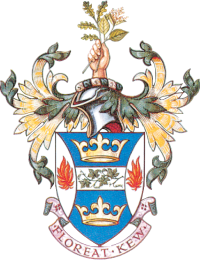Millennium Seed Bank and Wakehurst Place, 7 July
News / 22nd Jul 2019
Thirteen members gathered at Wakehurst Place on Sunday morning for a tour of the Millennium Seed Bank (MSB). Our guide was Dr John Dickie, Head of Seed and Lab-based collections at Kew. We were treated first to a talk in the seminar room explaining the work of the Seed Bank, before touring the laboratories and cold store.
All life on earth depends on plants, but the MSB is the only seed bank in the world concentrating on wild-collected seed on a global basis. Plants are essential to mankind for food, medicine, construction etc, as well as regulating climate, controlling flooding, nutrient recycling and other ecosystem services. Yet the natural environment is being destroyed at an ever increasing rate. At least 20% of plant species are threatened with extinction through habitat loss, expanding human populations and climate change. The MSB is addressing these problems through seed banking, and has a target to bank 25% (75,000) of the world’s bankable plant species by 2020.
Dried and frozen seed can live for many decades when stored in optimal conditions. Seed is collected in the field and brought to the MSB. There it is cleaned, dried at 15°C and 15% relative humidity, and finally frozen and stored in underground vaults at -20°C. However, seeds vary greatly in how long they can be kept in storage. We learned that tales of wheat being germinated from the pyramids in Egypt were a fraud! Research at the MSB investigates the importance of collection timing, temperature and moisture content on different seeds, and includes regular germination testing of the stored seed to develop propagation protocols for each species.
We learned that three plants provide 50% of all human food energy: rice, wheat and maize. Wild relatives of these important crops contain useful genes that can be used in breeding programmes to improve the crop by conferring useful traits like disease resistance or higher yield. In many countries humans are also dependent on wild plants e.g. in Tanzania wild plants provide 30% of household livelihoods, and in most countries livestock primarily eat wild forage species. 75% of the world’s people rely on plants for traditional medicines, such as aspirin which originated from the bark of willow and has been used as a painkiller for at least 2000 years. Drugs derived from the Madagascan rosy periwinkle have much improved the chances of recovery from childhood leukaemia . Seed supplied by the MSB has helped in the development of a biological control for Japanese Knotweed. The banking of wild collected seed is an important way to preserve some of the world’s plant diversity and potential before it is lost forever.

Touring the laboratories.
Some seeds do not survive drying and freezing, particularly trees from tropical rainforest and some alpine species e.g. certain species of Primula. Methods have been developed to store these seeds (known as “recalcitrant”) in liquid nitrogen.
The MSB is actually a partnership between Kew and 170 partner institutions in 85 countries. Seed is kept in trust for conservation and research purposes. It is supplied to organisations for a variety of purposes e.g. habitat restoration, conserving endangered or endemic species and improving rural livelihoods, but always with the prior consent of the partner institution in the country where the seed was collected.
The talk was followed by a tour of the laboratories, following the route of incoming seeds through the cleaning, drying, testing and freezing processes. We were led down to the underground vaults, viewing the many rows of shelving carrying kilner jars of seeds.

Being shown the Cold Store.

Wakehurst Place, June 2019.
Finally we were shown the accommodation area for international students coming to the MSB on training courses, enabling them to take MSB expertise back to their own partner countries.
We came away with a much better understanding of the worldwide scope and expertise of the work done at the MSB, and an appreciation of how that work is contributing to the protection of the natural environment for the benefit of humanity.
More articles
-

Kewite-mail Winter 2025/2026
News / 16th Feb 2026
-

Visit to Birmingham Botanic Gardens
Events / 25th Nov 2025
